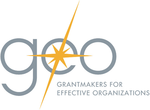W2: Pre-Conference Session: Designing Pathways to Collaborative Impact
Session Designer
Marianne Hughes, Interaction Institute for Social Change
Session Description
In a world as complex as ours, where problems are not well defined and the solutions are not clear, a different approach to problem solving is required. Grantmakers are more often stepping into their roles as convenors of collaborative problem solving initiatives. IISC has developed Pathway to Change™ — a collaborative problem-solving framework that helps grantmakers and others conduct stakeholder analyses to determine who needs to be engaged in the process, host conversations to create needed alignment and design roadmaps that will move their efforts forward. During this session participants will apply the Pathway to Change framework to a current work issue and learn the methods and tools needed to design and facilitate collaborative change.
Conference Theme
Collaborative Problem Solving
